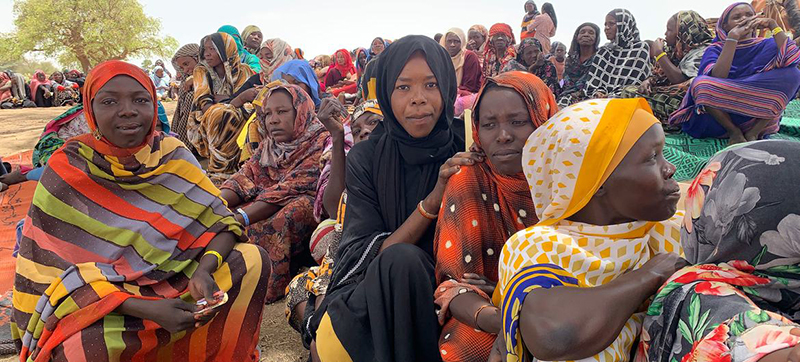 Sudan
Sudan Sudan conflict creates world’s fastest-growing displacement crisis: UN aid official
New York: As heavy fighting continues in Sudan, the UN’s top aid official in the country warned on Thursday that the conflict has created “the world’s fastest-growing displacement crisis” which threatens to outstrip the Organization’s best efforts to help those most in need.
“The past six months have caused untold suffering in Sudan” and forced more than 5.4 million people from their homes, said Clementine Nkweta-Salami, Deputy Special Representative of the Secretary-General and Resident and Humanitarian Coordinator in Sudan.
Speaking to journalists in Geneva, the UN official noted that approximately 30,000 a day have fled fighting, “some fleeing with nothing but the clothes on their backs”.
Ms. Nkweta-Salami continued: “I’ve met mothers in Sudan who’ve told me they don’t know where to find the next meal for their children. I’ve met families sleeping in makeshift shelters, struggling to find food and water and unable to access healthcare; their children out of school and the family breadwinners out of work.”
Conflict ‘could consume entire country’
Half of Sudan’s population – 24.7 million people - now require humanitarian assistance and protection, the UN official continued, before warning that conflict, displacement and disease outbreaks now “threaten to consume the entire country”.
Last month, the UN and partners delivered 3,000 tonnes of lifesaving aid supplies using 66 trucks across six states. “But we need to be able to deliver much more, safely, repeatedly and fast,” Ms. Nkweta-Salami insisted. “We need to reach 18 million people and we will not give up on that target.”
Harvests under threat
Clashes involving heavy weaponry and airstrikes broke out on 15 April between the Sudanese Armed Forces (SAF) and the Rapid Support Forces (RSF). Fighting initially focused in and around the capital, Khartoum, along with the Darfur region, but Ms. Nkweta-Salami expressed concerns that the conflict could spread to Gezira state, Sudan's breadbasket.
“This would have great consequences for food security,” she said, noting that the violence “has already crippled Sudan's health sector, with 70 per cent of all hospitals no longer functional”.
Humanitarians are equally concerned about reports of increasing cases of sexual and gender-based violence, enforced disappearances, arbitrary detention and grave violations of human and children's rights.
Cholera ‘near impossible to control’
In addition to the destruction of war which is believed likely to have claimed thousands of lives including 19 aid workers to date, Sudan’s people have also faced further shocks in recent weeks as heavy rains and floods have affected more than 70,000 people across seven states, prompting concerns of a spike in waterborne diseases.
A cholera outbreak has been declared in the eastern state of Gedaref and humanitarians are already investigating whether it has spread to Khartoum and South Kordofan.
“With fighting escalating, it may be near impossible to control,” Ms. Nkweta-Salami said, as she called on the warring parties to recommit to previous pledges to “de-escalate fighting, minimize civilian harm and refrain from any disproportionate attacks”.
Humanitarians ‘pushing the limits’
Delivering aid in a warzone is extremely complicated, dangerous and time-consuming, often involving negotiations with various armed groups for access to remote communities, the UN official explained.
Despite these challenges, she insisted that relief teams were stepping up efforts to reach Sudan’s most vulnerable communities.
“We have a very committed humanitarian team on the ground, we are trying to push the limits of our ability to reach some of these hard-to-reach areas. And I think if we get a strong not only commitment, but a commitment that is translated today into positive action by all the parties to this conflict, then hopefully we will have no longer deaths amongst humanitarian workers.”
Support Our Journalism
We cannot do without you.. your contribution supports unbiased journalism
IBNS is not driven by any ism- not wokeism, not racism, not skewed secularism, not hyper right-wing or left liberal ideals, nor by any hardline religious beliefs or hyper nationalism. We want to serve you good old objective news, as they are. We do not judge or preach. We let people decide for themselves. We only try to present factual and well-sourced news.







